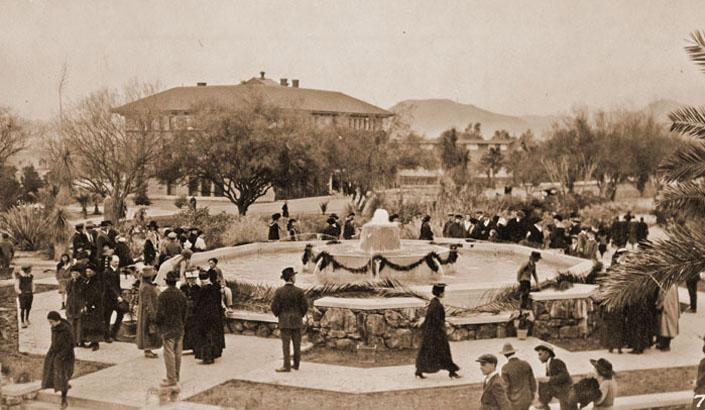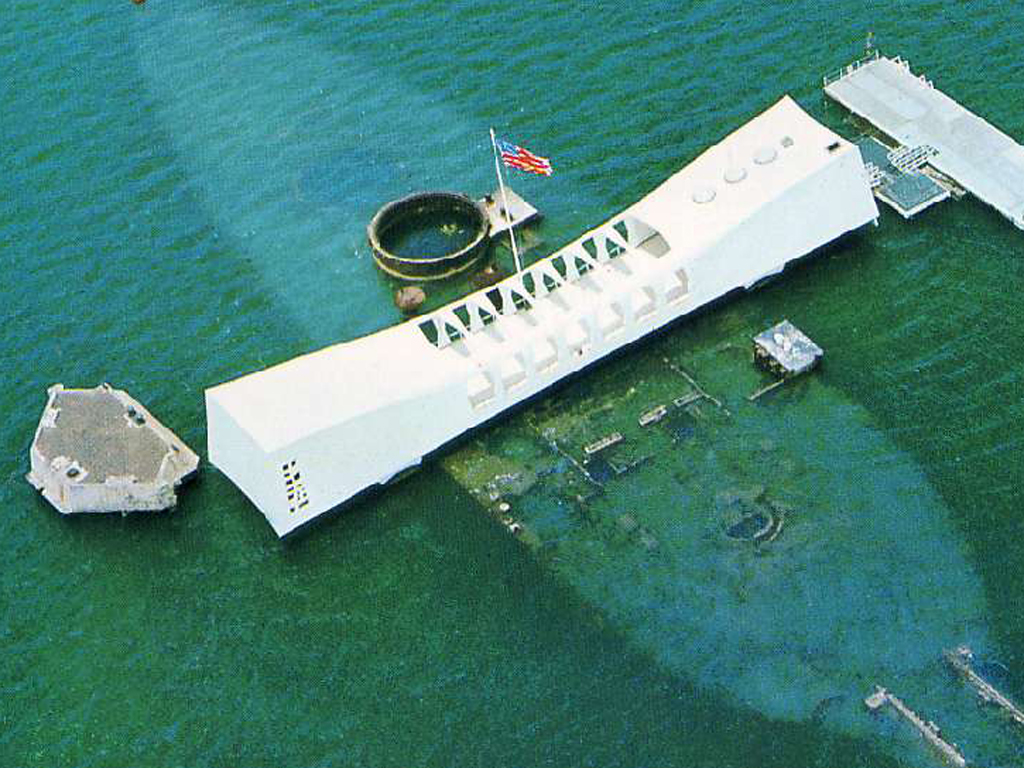Remembering the Morenci Marines
MAY 25, 2012
CALEB PIRTLE III
On Memorial Day, some – maybe many – who dig a bleak and empty earth to work the copper mines of Morenci, Arizona, will trek their way slowly and painfully to the crest of Mares bluff overlooking the neighboring town of Clifton. It will be hot and dusty, and they will gaze across a barren landscape that’s not much more than a few scattered houses and a deep, ragged gash that the machines of man have torn into the ground. They have come to honor and pray once again for the Morenci Nine, a band of Marines who ran wild on Morenci’s football field, scrapped their way to victories they probably shouldn’t have won, then marched off to fight in a land that most of the town had never heard of until America went to war.
The flag honoring Bobby Dale Draper
They were always together, and nothing could separate them.
They were Hispanic, Native American, and Anglo, and the boys believed that sweat and blood, when they ran together, and they had ran together often on their own personal fields of battle, forged a brotherhood that neither time nor distance could tear apart.
They were seniors. But their country had gone to fight the evils of communism in a curious little country that had been ripped apart, north and south.
They were only nine. But their country needed them.
They gave little thought to college. They marched down as a group to join the Marine Corps, too old to be boys and not yet quite old enough to be men. Eight passed the aptitude test. Joe Sorrelman, a Navaho, did not. The other eight balked. They would all go together, or they would not go at all.
The Marine recruiter looked at their eyes. No one was bluffing. He promptly gave Sorrelman the aptitude test again. The boy passed. Whether the test was graded or not has never been known.
Morenci waved goodbye. The nine were gone. They rode away on Independence Day of 1966.
Bobby Dale Draper had been an All-State linebacker, and a handful of college coaches were following his every game. It didn’t matter. He and his friends were sitting around one night, already talking about what they would do with their lives when the war ended, their pockets were full of separation pay, and they were back home again.
One turned to Bobby Dale and asked, “Are you still going to college and play football?”
“No.”
“Why not?”
“I’m not coming back,” he said.
The plaque outside the new highs school pays tribute to the Morenci Nine.
Stan King was the oldest, the contemplative leader of the nine. He was tall, six-feet-four, a three-sport letterman, and had decided to study engineering at the University of Arizona. But that was before the war disrupted his plans. He no longer thought of college.
King drove his mother to the Clifton Cemetery one afternoon and picked out the site of his grave. “He loved that place,” she remembered. “He loved those beautiful red hills.”
Alfred Van Whitmer had devoted many hours to riding his quarter horse through the secluded countryside of the famed Coronado Trail. He was proud of his parents for purchasing a new home, and just before he left for Camp Pendleton, Whitmer went to town and increased his life insurance.
“Why did you do that?” his father asked.
“Dad,” he replied, “I’m going to pay off this place for you.”
They called Jose Moncayo “Cowboy,” because he was tall and husky and talked more about horses than girls. The day he left Morenci, he told his mother, “Promise me one thing.”
“What’s that?”
“Please don’t cry when they bring my body back.”
Clive Garcia was photographed with his mother before he departed for Vietnam. He wrote a note on the back of the picture before giving it to her. It said, “Your eyes are swollen. You’ve cried too much, Mom. Life itself really isn’t this bad. We only have a few sad moments. All we can do is accept and live with reality.”
“Don’t worry,” he told her.
“I can’t help it.”
“Never forget that I will be brought home by someone who loves me – a grunt, mom, a grunt like me.”
Draper died in an ambush, leading his squad as they searched for mines alongside a road. King was killed only six days after he set foot in Vietnam. Moncayo’s entire platoon was wiped out near Quant Tri. No one survived. Whittmer died in the bloody aftermath of the Tet Offensive. The official report said that Garcia had volunteered to lead an unscheduled patrol in Quang Nam Province when he was struck down by a mine explosion. He died instantly. Rumor persisted that he had been killed on a secret mission in Laos. But no one admitted being in Laos. He might have been saved, said the rumor, but the military refused to send a plane in to retrieve him. The military wanted their presence in Laos to remain unknown and a secret. The expendables in war so often wear the faces of boys.
Larry West had been the restless one. He had endured one tour in Vietnam but did not take well to garrison life in California. He was bored and asked to go back. Coach Vernon Friedli saw him on leave one night, leaning up against the wall at a bowling alley. The boy’s eyes were blank, staring into space. His mind, the coach figured, must be a thousand miles away. West suddenly looked around, saw his coach, forced a grin, shook the man’s hand, and said, “It’s been nice knowing you.”
“What do you mean, son?” the coach asked.
“There’s no way for me,” West said. “I’ve come close to it a number of times. I won’t be back.”
Like the others, his premonition was a valid one. West was shot near Quant Nam while serving with a landing team.
Nine marched away from the mines of Morenci.
Only three came home alive. Leroy Cisneros has endured forty missions as point man on dangerous patrols. Joe Sorrelman had failed his original aptitude test with the Marines and been given a second chance. He was home attending his older brother’s funeral when he learned that, the day after he flew out of Vietnam, his whole platoon had been destroyed, save one man. Mike Cranford came home, but he never did quite remove himself or his troubled mind from those days of harrowing combat. Guilt? They had some. They had more than anyone would ever know.
Morenci would never recover from the sight of Marine officers knocking on doors, bringing condolences from the President. For a while, it seemed as though the secession of funerals would never end. The life of the town was shattered by the sounds of Taps and twenty-one gun salutes. But as Coach Friedli said, “This is too tough a community to be broken. Bent, perhaps, even stretched out of shape. But not broken.”
And now the good folks of Morenci will again trek slowly and painfully to crest of Mares Bluff overlooking the neighboring town of Clifton to say a prayer and dredge up memories that have never gone anywhere.
On the bluff, Oscar Urrea and Vietnam veteran Stephen Guzzo have created their own memorial to those who have served and those who have died in war. Guzzo calls it “The Long Walk for Freedom.” It includes flags, a fallen soldier’s cross, a Bible that rests in a wooden box to symbolize the importance of faith, a plaque with the names of all twelve area soldiers who died in Vietnam, and an unbroken string of more than eighteen hundred dog tags to honor America’s fighting men, then and now.
Neither will ever forget the first six dog tags they reverently placed on the fence.
They belonged to the boys from Morenci.
httpv://youtu.be/8G-8p9oX8Hc" target="_blank
http://venturegalleries.com/blog/rememb ... i-marines/








